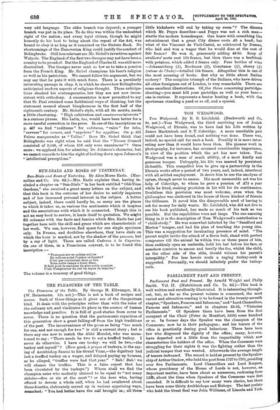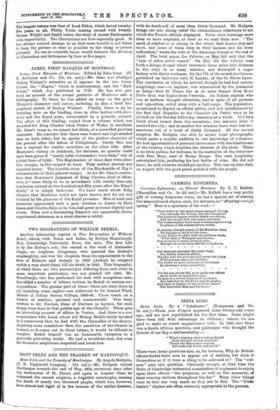PARLIAMENT PAST AND PRESENT.
Parliament Past and Present. By Arnold Wright and Philip Smith. Vol. H. (Hutchinson and Co. 7s. 6d.)—This book is well written and excellently illustrated. It is interesting through- out, but, as far as the present volume is concerned, the most varied and attractive reading is to be found in the twenty-seventh chapter," Speakers, Famous and Infamous," and "Lord Chancellors, Famous and Infamous," and in chapters 33-35, " Victorian Parliaments." Of Speakers there have been from the first occupant of the Chair (Peter de Montfort, 1259) some hundred or so. In former days the Speaker was the champion of the Commons; now he is their pedagogue; and his tenure of the office is practically during good behaviour. There have been few who disgraced the dignity of the office; many, however, have departed not a little from the impartiality which now characterises the holders of the office. When the Commons were struggling for their rights it was the fighting rather than the judicial temper that was wanted. Afterwards the average length of tenure increased. The record is held at present by the Speaker- ship of Arthur Onslow, who held the post from 1727 to 1761, presiding over five Parliaments. Lord Chancellors and Lord Keepers. whose presidency of the House of Lords is not, however, an important matter, have been about as numerous, reckoning from 120), about the time when Speakers of the Commons were first recorded. It is difficult to say how many were clerics, but there have been some thirty Archbishops and Bishops. The last prelate who held the Great Seal was John Williams, of Lincoln and York. The longest tenure was that of Lord Eldon, which lasted twenty- five years in all, Philip Yorke coming second with twenty. Messrs. Wright and Smith relate the story of recent Parliaments with impartiality. The illustrations are here especially good. It as always seemed strange to us that more trouble is not taken to keep the picture as near as possible to the thing or person pictured. No one in scientific books would tolerate the division of illustration and letterpress by four or five pages.



























































 Previous page
Previous page